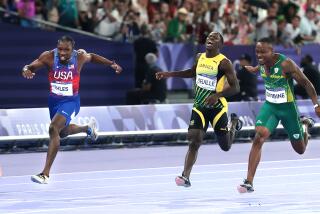World Cup Track and Field Meet : Kingdom’s 12.87 Is Wind-Aided
- Share via
BARCELONA, Spain — When Roger Kingdom saw his world-record time on the scoreboard after he won the World Cup 110-meter hurdles Sunday night, he could not believe it. Then, he could. Near the end of his victory lap, he discovered that he was right the first time.
After running the high hurdles in 12.92 seconds earlier this summer to break Renaldo Nehemiah’s eight-year-old record, Kingdom bettered that at Montjuic Olympic Stadium with a 12.87.
“No, no, no,” Kingdom said as he looked at the time flashing on the scoreboard. “Not twice in one season.”
“Yes, yes,” Spanish hurdler Javier Moracho said as he congratulated Kingdom.
Moracho was wrong both times. As he and runner-up Colin Jackson of Great Britain jogged down the backstretch side by side on their victory lap, Jackson pointed to the wind gauge, which registered a plus 2.51 meters per second for the race. The allowable tail wind for record consideration is 2.0.
“I was hoping it was for another race,” Kingdom said of the wind reading. “But, unfortunately, they called out that it was for ours. It was very disappointing. When the gun fired, the wind was in our faces.”
Still, it was the fastest time ever recorded in the event under all conditions. The previous best was the 12.91 that Nehemiah ran 10 years ago with a 3.5 meter-per-second wind at his back. In finishing second Sunday night, Jackson ran 12.95, the fifth-fastest time under all conditions.
Even with the prevailing wind, Kingdom’s time was remarkable considering that only minutes before the track looked like a moat.
A sudden, heavy downpour caused a two-hour delay in the meet and caused about half of the 43,574 who bought tickets to find something else to do, presumably indoors. There was even talk of canceling the final session of the three-day competition, until the rain suddenly subsided.
Despite a superb job by the squeegee patrol, the track was still so wet when the hurdlers were called to the starting line that Poland’s Thomaaz Nagorka took one look and decided to return to the dressing room.
“He was on the track and decided not to run,” said U.S. Coach Harry Groves of Penn State. “I talked to his coach afterward, and he was banging his head against the wall.”
That was the coach of the European all-stars, who entered that race tied with the United States for first place in the men’s standings.
Seeking its third title in five World Cups, the United States earned nine points from Kingdom’s first-place finish. Europe expected as many as six from Nagorka and instead got none because he scratched. So much for solidarity from the Pole.
The Europeans never overcame the deficit, although a victory by Sweden’s Patrik Sjoberg in the high jump with a meet record 7-feet 8-inches brought them within two points entering the final event, the 1,600-meter relay.
The United States was second in that race to finish with 133 points. The Europeans were a distant sixth in the relay and finished with 127 points. Great Britain scored 119 points for third place.
“We didn’t look real glamorous at the end,” said Groves, who could count only five first-place finishes in 20 events among his team’s points. “But we did what we came to do.”
The East German women won their fourth consecutive World Cup championship with 124 points, easily beating the 116 scored by the second-place Soviet Union. With only two first-places in 16 events, the United States finished fifth with 84.5 points.
But the United States had a courageous effort Sunday night in the 3,000 from PattiSue Plumer. With little more than a lap remaining, she clipped the heels of Soviet Tatiana Pozdnyakova and went sprawling. When she did, East German Ellen Kiessling tripped over her and also fell.
Pozdnyakova ran ahead in a futile attempt to catch the eventual winner, Great Britain’s Yvonne Murray. Kiessling got back on her feet first and soon was challenging Kenyan Helen Kimayio for third place.
But entering the stretch, running with a strained left knee suffered in the collision, Plumer began to gain on them. In the final 10 meters, she edged ahead of Kiessling for third place.
The meet’s outstanding performer was Cuba’s Ana Quirot, who anchored the Americas all-stars to first place in the 1,600-meter relay Friday and added an individual gold in the 800 meters Saturday with the third-fastest time ever.
Finally running out of energy, she was overtaken in the stretch of Sunday night’s 400 meters by France’s Marie-Jose Perec. Perec crossed the finish line in 50.30, Quirot in 50.60. But Perec later was disqualified for running out of her lane, giving Quirot her third gold.
With the world’s fastest time in 1989 in the 400 and the 800, Quirot, 26, has a good chance to be named woman athlete of the year.
More to Read
Go beyond the scoreboard
Get the latest on L.A.'s teams in the daily Sports Report newsletter.
You may occasionally receive promotional content from the Los Angeles Times.






